|
|
|
Sort Order |
|
|
|
Items / Page
|
|
|
|
|
|
|
| Srl | Item |
| 1 |
ID:
103825
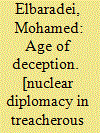

|
|
|
|
|
| Publication |
London, Bloomsbury Publishing, 2011.
|
| Description |
340p.
|
| Standard Number |
9781408817001
|
|
|
|
|
|
|
|
|
|
|
|
Copies: C:1/I:0,R:0,Q:0
Circulation
| Accession# | Call# | Current Location | Status | Policy | Location |
| 055947 | 327.1747/ELB 055947 | Main | On Shelf | General | |
|
|
|
|
| 2 |
ID:
155770
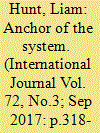

|
|
|
|
|
| Summary/Abstract |
American nuclear diplomacy generally presents a set of explanatory conditions ripe for the political realist: rogue states, an alarmed public, and existential risk create a milieu apt for realpolitik. This case study closely examines the link between the Joint Comprehensive Plan of Action and the theoretical trends in United States foreign policy, specifically with respect to the dictates of neorealism. At the time of writing, the bulk of literature on the Joint Comprehensive Plan of Action and its consequent developments remains lacking in theoretical commentary on how the agreement relates to broader narratives of United States foreign policy. This essay bridges the gap in the literature by drawing a connection between the Iran nuclear deal, neorealism, and liberal institutionalism. The findings suggest that the Joint Comprehensive Plan of Action marks a significant deviation from the predictions of realism, instead acting as an example of liberal institutionalism and potentially signalling a greater shift toward multilateralism in United States foreign policy.
|
|
|
|
|
|
|
|
|
|
|
|
|
|
|
|
| 3 |
ID:
056714
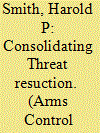

|
|
|
| 4 |
ID:
107769
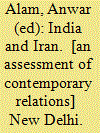

|
|
|
|
|
| Publication |
New Delhi, New Century Publications, 2011.
|
| Description |
xxi, 328p.
|
| Standard Number |
9788177082760, hbk
|
|
|
|
|
|
|
|
|
|
|
|
Copies: C:1/I:0,R:0,Q:0
Circulation
| Accession# | Call# | Current Location | Status | Policy | Location |
| 056268 | 327.54055/ALA 056268 | Main | On Shelf | General | |
|
|
|
|
| 5 |
ID:
063712
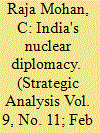

|
|
|
| 6 |
ID:
158890
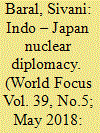

|
|
|
|
|
| Summary/Abstract |
The idea of cooperation between India and Japan in the field of civil nuclear energy was mooted during the visit of India’s then Prime Minister Manmohan Singh to Japan in 2005. Japan then gave a commitment to India to enhance civil nuclear energy cooperation under appropriate IAEA safeguards.
|
|
|
|
|
|
|
|
|
|
|
|
|
|
|
|
| 7 |
ID:
099481
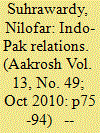

|
|
|
| 8 |
ID:
141117
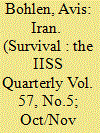

|
|
|
|
|
| Summary/Abstract |
Negotiation is an essential tool of diplomacy, as weapons are of war. The recently concluded Iran deal represents a major diplomatic achievement arrived at by long and patient negotiation. Its significance is likely to go far beyond the terms of the accord itself and must be judged in a broader diplomatic and strategic context. The Iran nuclear deal is important first and foremost for the stringent limits it places on Iran’s nuclear programmes – the principal goal of the negotiations. US President Barack Obama and Secretary of State John Kerry have been quick to deny that expectations of broader detente were in any way the premise for the negotiation. But the agreement does, in fact, have the potential to open up the frozen dialogue between the US and Iran and permit a broader discussion of urgent regional issues. This potential unblocking of the relationship could be one of the agreement’s great rewards.
|
|
|
|
|
|
|
|
|
|
|
|
|
|
|
|
| 9 |
ID:
117669
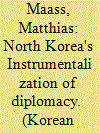

|
|
|
| 10 |
ID:
093561
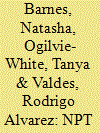

|
|
|
|
|
| Publication |
2010.
|
| Summary/Abstract |
This article assesses the impact of the U.S.-led disarmament agenda on the disarmament diplomacy and policies of the three nuclear-capable states not party to the Treaty on the Non-Proliferation of Nuclear Weapons (NPT)-India, Israel, and Pakistan. These states, often referred to as "NPT holdouts," undermine the application of the NPT obligations on all parties. Universality of the treaty framework has long been considered vital to strengthen the nuclear nonproliferation regime and consolidate non-nuclear norms. But can new U.S.-led disarmament momentum create the necessary dynamics to encourage the holdouts to disarm, or is this wishful thinking? This article argues that sustained disarmament momentum from the Western NWS will not be enough-a more comprehensive approach to disarmament is needed, including a genuine commitment by all NWS to engage in transparency and reductions, and full nuclear compliance and cooperation by Iran.
|
|
|
|
|
|
|
|
|
|
|
|
|
|
|
|
| 11 |
ID:
060090
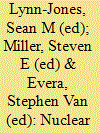

|
|
|
|
|
| Publication |
Cambridge, MIT Press, 1990.
|
| Description |
xv, 347p.hbk
|
| Series |
International Security Readers
|
| Standard Number |
0262121522
|
|
|
|
|
|
|
|
|
|
|
|
Copies: C:1/I:0,R:0,Q:0
Circulation
| Accession# | Call# | Current Location | Status | Policy | Location |
| 033160 | 327.174/LYN 033160 | Main | On Shelf | General | |
|
|
|
|
| 12 |
ID:
061395
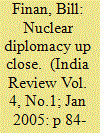

|
|
|
|
|
| Publication |
Jan 2005.
|
| Summary/Abstract |
The essay reviews former Deputy Secretary of State Strobe Talbott’s memoir of his diplomatic efforts in South Asia both before and after the 1998 nuclear tests were carried out by India and Pakistan. Why the Clinton administration failed to deal with the nuclear threat in South Asia seriously before 1998 is examined first, with the finding that the administration’s argument – and Talbott’s – that other foreign policy matters were more demanding only highlights the administration’s inadequate concern with South Asia generally. Talbott’s role in trying to gain India’s signature on the CTBT is also evaluated, with the conclusion that, although he failed to reach that goal, his diplomacy did reengage the United States with India, which has formed the basis for more stable and fluent relations.
|
|
|
|
|
|
|
|
|
|
|
|
|
|
|
|
| 13 |
ID:
146547


|
|
|
| 14 |
ID:
123691
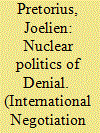

|
|
|
|
|
| Publication |
2013.
|
| Summary/Abstract |
AbstractSouth Africa was one of the first states to conclude an Additional Protocol with the International Atomic Energy Agency (IAEA) in 2002, allowing the IAEA greater right of access to safeguard nuclear activities and material. In light of this, some observers in the arms control community find it odd that South Africa's representatives at the Nuclear Suppliers Group (NSG) would be the main objectors to making the conclusion of an Additional Protocol a precondition for states wishing to import uranium enrichment and reprocessing technology (classified as sensitive nuclear technology and material). The South African objection should be viewed as only the most recent in a series of objections to measures that may seem obviously in line with nuclear non-proliferation. This emerging pattern in South Africa's nuclear diplomacy and, more specifically, the objection to the Additional Protocol condition are related to its membership in the Non-Aligned Movement (NAM) and can be investigated through the lens of a politics of denial. Denial is the act of saying "no", but it is also in psychological parlance the unconscious thought process manifesting a refusal to acknowledge the existence of certain unpleasant aspects of external reality. It will be argued that South Africa's opposition to the Additional Protocol condition can be explained in the context of two instances of denial: (i) a perceived denial by the nuclear haves of what the Nuclear Non-Proliferation Treaty codifies as an inalienable right to peaceful nuclear technology - something that South Africa is cautious to be complicit in; and (ii) the nuclear weapon states' denial (the psychological meaning) of the unpleasant reality of a hypocritical nuclear order - something that South Africa wants to expose or at least something with which to engage to limit the effects for itself and other NAM members. The politics of denial does not yield to a pragmatist/utopian dichotomy in the nuclear realm, but instead reveals the dialectic nature of realism and idealism in nuclear politics, especially as reflected in South Africa's nuclear diplomacy.
|
|
|
|
|
|
|
|
|
|
|
|
|
|
|
|
| 15 |
ID:
129719
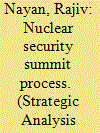

|
|
|
|
|
| Publication |
2014.
|
| Summary/Abstract |
The third Nuclear Security Summit will be held in The Hague, Netherlands in March 2014. This visionary nuclear diplomacy will be facing both old and new questions at its third meeting. The basic question relates to the future of the summit process, which has made a significant contribution to international security in a very short span of time. The summit process, however, may serve it better, and the strengthening of the regime must be continued through the next two summits. However, with or without the summit process, the nuclear security regime has to be strengthened. Efforts for nuclear security must continue through proper institutionalisation, keeping the International Atomic Energy Agency at the centre.
|
|
|
|
|
|
|
|
|
|
|
|
|
|
|
|
| 16 |
ID:
063658
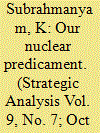

|
|
|
| 17 |
ID:
076301
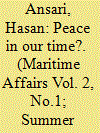

|
|
|
| 18 |
ID:
055303
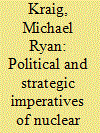

|
|
|
|
|
| Publication |
2003.
|
| Summary/Abstract |
This article examines the fundamental drivers of the South Asian nuclear standoff as it currently exists, assessing the likely stability or instability of nuclear deterrence from a geopolitical perspective. The analysis illuminates the basic political imperatives underlying bilateral deterrence on the Asian subcontinent (India-Pakistan and India-China), and in doing so provides assessments of the risks and dangers accompanying the India-Pakistan and India-China nuclear relationships. The author utilizes the history of US nuclear diplomacy, doctrine, and deployments - in particular, US reliance on coercive diplomacy as a crisis management tool during the Cold War - to shed light on the India-Pakistan deterrent relationship. This examination allows for a more grounded and realistic judgment of the likely success of dedicated confidence-building regimes that could involve Western aid and advice.
|
|
|
|
|
|
|
|
|
|
|
|
|
|
|
|
| 19 |
ID:
059005
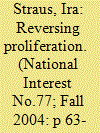

|
|
|
| 20 |
ID:
153542
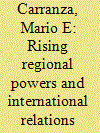

|
|
|
|
|
| Summary/Abstract |
This article explores Brazil and India's alternative paths in their search for great-power status. It examines the competing expectations of alternative IR theories regarding the conditions for great-power status in the post-Cold War era and their limited explanatory and predictive power. Although constructivism offers a more sophisticated approach, one also needs insights from realism/neorealism, neoliberal institutionalism, and globalization theory to understand the possibilities and limitations of the Brazilian and Indian strategies to be admitted to the great-power club. The article compares Brazil and India's foreign policies and nuclear diplomacy and challenges the idea that India's status as a nuclear weapon state enhances its prospects for joining the great-power club. Brazil does not possess nuclear weapons, but it has successfully created a consensual hegemonic regime in South America, which allows it to use a regionalist project (Mercosur, UNASUR) as a launching pad to gain admission to the great-power club. In contrast, despite possessing nuclear weapons, India has been unable to establish a consensual hegemonic regime in South Asia, and its “Pakistan problem” holds back her prospects for joining the great-power club. The article argues that a US blessing may not help India to gain entrance to the “board of the world” if other board members, such as China, resist India's admission. The conclusion examines the implications for IR theory of Brazil and India's alternative pathways to great-power status, and the impact of progress—or lack of progress—in global nuclear disarmament negotiations on both countries' possible admission to the great-power club.
|
|
|
|
|
|
|
|
|
|
|
|
|
|
|
|
|
|
|
|
|